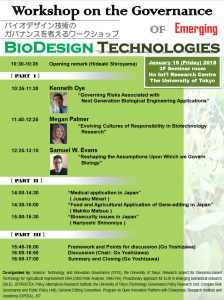The last decade has witnessed unprecedented advancement in emerging technologies in the field of biotechnology. Gene editing tool such as CRISPR-cas9 has prompted tremendous excitement for its application in the field of medicine, food and agriculture and energy. There is an increasing expectation for the benefit they can offer to the society at large but at the same time, concerns are raised against potential risks it may pose in the future.
In the consideration of the governance of emerging technologies, so-called ELSI must be taken into account, however, particularly in Japan, these discussions are not sufficient yet. Some debates are now taking place but they are done within the sector and lack an integrative meta-governance perspective. It is true that there are sector-specific/technology-specific features that have to be considered but there can also be lessons that can be commonly applied cross sectoral.
The aim of this workshop is to bring together experts in the field of new biotechnology in the US and Japan
– to share the current status, what is (/is not) being discussed in the US and in Japan
– to brainstorm what is the new (or not new) aspect about current new technologies (gene-editing, synthetic biotechnology, gene-drive) in the consideration of governance
– and to discuss what are the common issues that have to be considered, what are the sector specific factors for consideration
Date: January 19th (Friday), 2018
Venue: The University of Tokyo, Hongo campus, Ito International Research Centre, 3F Seminar room
=== Program ===
10:30-10:35 Opening remark (Hideaki Shiroyama)
PART I
10:35-11:30 Kenneth Oye
“Governing Risks Associated with Next Generation Biological Engineering Applications”
The field of biological engineering is in the midst of a period of unusually rapid change, driven by the convergence of advanced gene editing methods, improved design tools and integrated data sets. This talk will describe an array of current and emerging applications in agriculture, industry, medicine and environment, and then discuss associated environmental, safety and security effects. Applications will include modifications of fish and livestock, synthesis of fuels, flavors and drugs, regenerative medicines, SCGT, HGT and xenotransplantation and gene drives. Approaches to risk governance will include nonbinding guidelines, national regulations and international conventions, with emphasis on the need for adaptive approaches under conditions of uncertainty and controversy.
11:40-12:25 Megan Palmer
“Evolving Cultures of Responsibility in Biotechnology Research”
Rapid advances in biotechnology are leaving scientific communities and governments alike struggling to develop systems to ensure benefits are realized and risks mitigated. While fostering a “a culture of responsibility” among a rapidly globalizing practitioner community is widely recognized as critical to ensure a beneficial trajectory, there is a dearth of frameworks for understanding and promoting responsibility in practice. I will discuss several projects to address the challenge of conceiving and managing “cultures of responsibility” via the design and implementation of safety and security policies for biological research. These projects leverage international research venues, including the international Genetically Engineered Machine (iGEM) competition, as testbeds to discern factors critical to shaping norms and practices across increasingly diverse global communities.
12:25-13:10 Samuel W. Evans
“Reshaping the Assumptions Upon Which We Govern Biology”
The assumptions that are often made in the US about how biological innovation works actually create many of the problems we face in governing it today. In this talk, I outline these assumptions and ask how the American governance of biological innovation might be different we were to make the opposite assumptions. How we think about the structure of science and its relation to the state and to economy guides what we think are legitimate ways to govern that innovation process. I show this through specific examples on governing security concerns and environmental release. As Japan continues to develop its governance system for biology, attention might be usefully focused on the assumptions you are making about the science and technology, the role of the state and other actors, and the values to be pursued through the innovation. Debate could to be encouraged about whether those assumptions are fair, just, and desirable to the whole society, most importantly those who will be most negatively impacted by potential advances.
PART II
14:00-14:30 Medical application in Japan (Jusaku Minari) 20/10
14:30-15:00 Food and Agricultural Application of Gene-editing in Japan (Makiko Matsuo) 20/10
15:00-15:30 Biosecurity issues in japan (Nariyoshi Shinomiya) 20/10
PART III
15:45-16:00 Framework and Points for discussion (Go Yoshizawa)
16:00-17:00 Discussion Summary and Closing (Chair: Go Yoshizawa)
